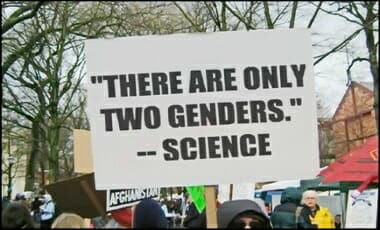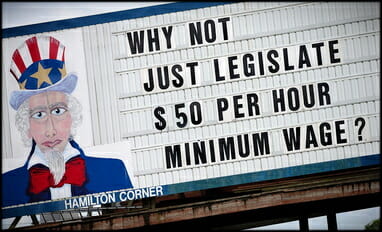MATT WALSH dissects an article written by a Princeton professor who claims that he can prove that there are more than two sexes. The Ivy League professor, Agustín Fuentes, has specialized knowledge in “racism,” “sex/gender” and “chasing monkeys,” according to his biography page. He argued in Scientific American magazine on Monday that biological reproductive cells (gametes) – such as sperm and egg cells – does not delineate whether someone is male or female. (BREITBART)
Princeton


“Emily” Condescends To “Lakisha” Yale Study Finds
Video Description: But guess who actually treats everyone, regardless of skin color, like they have a brain cell and a half to rub together? That’s right, my friends, it’s us. I’m totally shocked (except I’m not.)
The WASHINGTON TIMES has an article that reads in part:
White liberals present themselves as less competent when addressing minorities, while conservatives use the same vocabulary no matter what the race of their audience, according to a newly released STUDY.
Yale and Princeton researchers found that white Democratic presidential candidates and self-identified liberals played down their competence when speaking to minorities, using fewer words that conveyed accomplishment and more words that expressed warmth.
On the other hand, there were no significant differences in how white conservatives, including Republican presidential candidates, spoke to white versus minority audiences.
“White liberals self-present less competence to minorities than to other Whites — that is, they patronize minorities stereotyped as lower status and less competent,” according to the study’s abstract.
Cydney Dupree, assistant professor of organizational behavior at the Yale School of Management, said she was surprised by the findings of the study, which sought to discover how “well-intentioned whites” interact with minorities.
“It was kind of an unpleasant surprise to see this subtle but persistent effect,” Ms. Dupree said. “Even if it’s ultimately well-intentioned, it could be seen as patronizing.”….
(See also HOT AIR and the WASHINGTON EXAMINER for more info) Here are two videos to bring the point home:
But this is my PERSONAL favorite example of how Leftists view black persons:

The “Card-Krueger” Study Debunked
The audio is the later part of Larry Elder commenting on Jane Fonda going to Detroit to advocate a $12.00 minimum wage (DETROIT FREE PRESS). I have already posted quite a bit on this (see the section titled “Minimum Wage,” on my “ECON 101” Page). While sitting many other studies… I wanted to zero in on Larry discussing the David Card and Alan Krueger study. I have had it cited to me in discussion, so I wanted to have a post to link to to refute the study.
I wish to have the reader view what is working against the “Card-Krueger” study:
- A majority of professional economists surveyed in Britain, Germany, Canada, Switzerland, and the United States agreed that minimum wage laws increase unemployment among low-skilled workers. Economists in France and Austria did not. However, the majority among Canadian economists was 85 percent and among American economists was 90 percent. Dozens of studies of the effects of minimum wages in the United States and dozens more studies of the effects of minimum wages in various countries in Europe, Latin America, the Caribbean, Indonesia, Canada, Australia, and New Zealand were reviewed in 2006 by two economists at the National Bureau of Economic Research. They concluded that, despite the various approaches and methods used in these studies, this literature as a whole was one “largely solidifying the conventional view that minimum wages reduce employment among low-skilled workers.”
Thomas Sowell, Basic Economics: A Common Sense Guide to the Economy, 4th Edition (New York, NY: Basic Books, 2011), 241. [Link to 5th edition]
- Economists aren’t certain about many things, but on the minimum wage, nearly all of them (90 percent, according to one survey) believe that the case is open and shut. All else being equal, if you raise the price of something (for instance, labor), then the demand for it (for instance, by employers) will decline. That’s not just a theory; it’s a law.
James Glassman, “Don’t Raise the Minimum Wage,” Washington Post (Feb 24, 1998).
Here is the NEW YORK POST article the “Prince of Pico-Union” [Larry Elder] was referring to:
….Back in 1994, Princeton economists David Card and Alan Krueger claimed that they’d looked at Garden State fast-food outlets in the wake of the state’s 1992 minimum-wage hike — and found that employment increased relative to similar restaurants in next-door Pennsylvania.
But six years later, the Card & Krueger study was debunked in the same economics journal that originally published it.
The Jersey study first gained notoriety when President Bill Clinton cited it in support of his proposal to increase the federal minimum wage in the mid-’90s. The economists’ work provided for a compelling story: Telephoning restaurants in New Jersey and Pennsylvania before and after Jersey hiked its minimum wage, they reported an increase in employment.
But other economists were skeptical. After all, just over a decade earlier, a seven-volume report from Congress’ Minimum Wage Study Commission had established conclusively that each 10 percent increase in the minimum wage reduced employment for young people by as much as 3 percent.
As it turned out, there was good reason to be skeptical. A team of researchers from the Employment Policies Institute (where I’m now research director) collected actual payroll data from 25 percent of the franchised restaurant locations that Card and Krueger had telephoned — and found that the hard info had little resemblance to what the economists (actually, students working for them) had gathered via phone interviews that used an ambiguous set of questions.
The funky data gave the Princeton economists a picture of businesses making implausibly large changes in employment — from zero full-timers to 35 in less than a year, for instance, or from 60 part-time staff down to 15.
EPI presented these results in a hearing before Congress’ Joint Economic Committee, and responsible outfits stopped relying on it. (Where media coverage of the Card-Krueger work once praised as a “most compelling study,” editorials now described it as “snake oil” that had been “dropped faster than a mis-flipped burger.”)
Economists David Neumark (then at Michigan State University) and William Wascher (Federal Reserve Board) followed up with a detailed independent analysis of the realrestaurant payroll data, and published their findings in the same journal where the Card-Krueger study first ran.
Far from boosting employment, they found, the mandated wage increase in New Jersey decreased employment — just as economic theory would predict.
Yet Jersey advocates for a higher minimum wage still cite the study. The liberal think tank New Jersey Policy Perspective recently cited the study as “groundbreaking,” while Rob Duffey of the New Jersey Working Families Alliancewrote in an op-ed last monththat it is “the seminal report on the impact minimum-wage increases have on employment.”
Sadly, some journalists are also playing this game: In recent months, writers inBloomberg, TheChicago Tribune, TheWashington Post and TheNew York Timeshave also trotted out the study to support their points.
Perhaps this is understandable — proponents don’t have many good studies to hang their hats on. The vast majority of economic research (including 85 percent of the best studies from the last two decades) points to job losses rather than job gains after a minimum-wage hike.
[….]
Unemployment is already 27 percent among New Jersey teens, and 35.5 percent for black teens — and hiking the minimum wage, as the advocates so dishonestly propose, will only make it worse.
To be fair, Paul Krugman has changed his view (as he has gone more Left… if that were even possible) on this over the years. FORBES notes the change with an “old” Paul Krugman quote and then some later commentary after some new ones:
…So what are the effects of increasing minimum wages? Any Econ 101 student can tell you the answer: The higher wage reduces the quantity of labor demanded, and hence leads to unemployment. This theoretical prediction has, however, been hard to confirm with actual data. Indeed, much-cited studies by two well-regarded labor economists, David Card and Alan Krueger, find that where there have been more or less controlled experiments, for example when New Jersey raised minimum wages but Pennsylvania did not, the effects of the increase on employment have been negligible or even positive. Exactly what to make of this result is a source of great dispute. Card and Krueger offered some complex theoretical rationales, but most of their colleagues are unconvinced; the centrist view is probably that minimum wages “do,” in fact, reduce employment, but that the effects are small and swamped by other forces.
What is remarkable, however, is how this rather iffy result has been seized upon by some liberals as a rationale for making large minimum wage increases a core component of the liberal agenda–for arguing that living wages “can play an important role in reversing the 25-year decline in wages experienced by most working people in America” (as this book’s back cover has it). Clearly these advocates very much want to believe that the price of labor–unlike that of gasoline, or Manhattan apartments–can be set based on considerations of justice, not supply and demand, without unpleasant side effects.
[….]
Old Krugman said that Walmart paying higher wages might lead to less turnover, better morale and higher productivity. But only at Walmart because the operative part was “higher wages than other employers”. And that’s the one thing that a general rise in wages, for example a rise in the minimum wage, cannot accomplish.
New Krugman tells us that a rise in the minimum wage will accomplish exactly that thing that Old Krugman tells us is impossible.
Economics is, as they say, all about the incentives. And my best guess here is that the incentives that Krugman faces have changed. In the earlier period the people who patted him on the head and said that he was a good little economist (read for which “excellent economist, one of the best”) were people who were economists, people who actually understood the subject. Today the people who pat him on the head and insist he’s a great economist are the editorial team at the New York Times. Not known as a hotbed of economic knowledge but equally well known as a hotbed of liberal ideology as being rather more important than reality.
Ho hum, how the mighty are fallen and all that.
Besides Paul Kugman getting worked over by economist Pedro Schwartz, and Krugman is woefully wrong on what Keynsianism can do and not do, there are also some funny memes of him!
 |
 |
 |
 |
 |
 |

94% Of New Jobs Created During Obama’s Era Were Temporary Positions
This comes from YOUNG CONSERVATIVES:
From Investing:
A new study by economists from Harvard and Princeton indicates that 94% of the 10 million new jobs created during the Obama era were temporary positions.
The study shows that the jobs were temporary, contract positions, or part-time “gig” jobs in a variety of fields.
Female workers suffered most heavily in this economy, as work in traditionally feminine fields, like education and medicine, declined during the era.
The research by economists Lawrence Katz of Harvard University and Alan Krueger at Princeton University shows that the proportion of workers throughout the U.S., during the Obama era, who were working in these kinds of temporary jobs, increased from 10.7% of the population to 15.8%.
Krueger, a former chairman of the White House Council of Economic Advisers, was surprised by the finding.

Can Someone Be Glad for God’s Non-Existence?
- May I say that as our country was more religious, free speech was always understood well. Today, as society becomes more secular/atheistic… students need safe spaces to have a place to display their infantilization and routinely shut down dissenting ideas/speech. Religion (esp. the Judeo-Christian faith) creates courage in character expressed in community… secularism/atheism creates selfish ideals of a reality lived in a bubble. Even Richard Dawkins (famed atheist) said this of Christianity: “I have mixed feelings about the decline of Christianity, in so far as Christianity might be a bulwark against something worse.”
After someone posted this meme, a person said:
- “Amen! There is no God!”
(He meant no Christian God specifically as it is a predominately Christian Facebook group).
Now, I realize the original poster of the meme was not aware that this cuts both ways… and the atheist was merely pointing this out humorously. But this serves as a lesson EVEN FOR ATHEISTS.
So I replied:
I don’t know how someone could say “amen” to there not being a Judeo-Christian God? When comparing it to other worldview (say, pantheism, panentheism, finite godism, polytheism, etc), they have done almost zip for their respective societies.
Healthcare (nurses, hospitals, and is still the largest healthcare provider in the world), tackling the illiteracy problems as well as drunkeness (for instance the YMCA and Salvation ARMY and AA), education (all the leading universities like: Harvard, Yale, William and Mary, Princeton, Cambridge, and Westminster, etc… were founded as seminaries — so-to-speak — same goes for the medieval universities: University of Bologna, Oxford, University of Paris, etc.), languages unified in many nations across the globe by missionaries (Bengali is one example, other indigenous languages were preserved by [one example] William Carey, who because he unified the languages in India… the government formed for the first time a language that could include the general population in being involved), Historian Alvin Schmidt points out how the spread of Christianity and Christian influence on government was primarily responsible for outlawing infanticide, child abandonment, and abortion in the Roman Empire (in AD 374); outlawing the brutal battles-to-the-death in which thousands of gladiators had died (in 404); outlawing the cruel punishment of branding the faces of criminals (in 315); instituting prison reforms such as the segregating of male and female prisoners (by 361); stopping the practice of human sacrifice among the Irish, the Prussians, and the Lithuanians as well as among other nations; outlawing pedophilia; granting of property rights and other protections to women; banning polygamy (which is still practiced in some Muslim nations today); prohibiting the burning alive of widows in India (in 1829); outlawing the painful and crippling practice of binding young women’s feet in China (in 1912); persuading government officials to begin a system of public schools in Germany (in the sixteenth century); and advancing the idea of compulsory education of all children in a number of European countries.
Etc., etc., etc….
There was also strong influence from Christian ideas and influential Christians in the formulation of the Magna Carta in England (1215) and of the Declaration of Independence (1776) and the Constitution (1787) in the United States. These are three of the most significant documents in the history of governments on the earth, and all three show the marks of significant Christian influence in the foundational ideas of how governments should function.
This is important because….
The World Forum on Democracy reports that in 1950 there were 22 democracies accounting for 31% of the world population and a further 21 states with restricted democratic practices, accounting for 11.9% of the globe’s population. Since the turn of the century, electoral democracies now represent 120 of the 192 existing countries and constitute 58.2% of the world’s population.
The impact of this Christian founded nation and Christians on Democracy and the ending of slavery for the first time in world history is nothing short of miraculous.
What have non-God [atheistic worldview] type governments done????????
They have done in one century what all of the worlds religions could not accomplish in the previous 19-centuries… kill a record number of people.
[Yes, that includes the newest and most deadly religion in the stats — Islam. Out of all the religious wars in written world history… Islam claims almost 2/3rds of them. But this can be expected from it’s founder who slit the throats of men, women, and children.]
THREE Books To Read:
✦ How the West Won: The Neglected Story of the Triumph of Modernity, by Rodney Stark;
✦ How Christianity Changed the World, by Alvin Schmidt;
✦ The Book that Made Your World: How the Bible Created the Soul of Western Civilization, by Vishal Mangalwadi.
The above was my quick response on Facebook… here is another great short list from Life Coach for Coach:
- Hospitals, which essentially began during the Middle Ages.
- Universities, which also began during the Middle Ages. In addition, most of the world’s greatest universities were started for Christian purposes.
- Literacy and education for the masses.
- Capitalism and free enterprise.
- Representative government, particularly as it has been seen in the American experiment.
- The separation of political powers.
- Civil liberties.
- The abolition of slavery, both in antiquity and in more modern times.
- Modern science.
- The discovery of the New World by Columbus.
- The elevation of women.
- Benevolence and charity; the good Samaritan ethic.
- Higher standards of justice.
- The elevation of common man.
- The condemnation of adultery, homosexuality, and other sexual perversions. This has helped to preserve the human race, and it has spared many from heartache.
- High regard for human life.
- The civilizing of many barbarian and primitive cultures.
- The codifying and setting to writing of many of the world’s languages.
- Greater development of art and music. The inspiration for the greatest works of art.
- The countless changed lives transformed from liabilities into assets to society because of the gospel.
[And Twenty-One:]
The eternal salvation of countless souls.
The last one mentioned, the salvation of souls, is the primary goal of the spread of Christianity. All the other benefits listed are basically just by-products of what Christianity has often brought when applied to daily living.
When Jesus Christ took upon Himself the form of a man, He imbued mankind with dignity and inherent value that had never been dreamed of before. Whatever Jesus touched or whatever He did transformed that aspect of human life.
Many are familiar with the 1946 film classic It’s a Wonderful Life, wherein the character played by Jimmy Stewart gets a chance to see what life would be like had he never been born. The main point of the film is that each person’s life has an impact on everybody else’s life. Had they never been born, there would be gaping holes left by their absence. Jesus has had an enormous impact—more than anybody else—in history. Had he never come, the hole would be a canyon about the size of a continent.
Another great (downloadable in PDF or .DOC) can be found at Journey of Cross and Quill. Here is one paragraph as an example of the excellent post:
Schmidt quotes Lynn White, historian of medieval science, as saying “From the thirteenth century onward into the eighteenth every major scientist, in effect, explained his motivations in religious terms” (222). William Occam (1280-1349) had a great influence on the development of modern science. His concept known as “Occam’s Razor” was the scientific principle that states that what can be done or explained with the fewest assumptions should be used. It is the principle of parsimony. As was common with almost all medieval natural philosophers, Occam did not confine himself to scientific matters and wrote two theological treatises, one dealing with the Lord’s Supper and the other with the body of Christ, both of which had a tremendous impact on Martin Luther’s thinking (Schmidt 222). Leonardo Da Vinci (1452-1519), while a great artist and painter was also a scientific genius who analyzed and theorized in the areas of botany, optics, physics, hydraulics, and aeronautics. However, his greatest benefit to science was in the study of physiology in which he produced meticulous drawings of the human body (Schmidt 223). Andreas Vesalius (1514-64) followed in Da Vinci’s footsteps. In his famous work, De humani corpis fabrica (Fabric of the Human Body), published in 1543, he corrects over two hundred errors in Galen’s physiological writings. (Galen was a Greek physician of the second century) The errors were largely found by dissecting cadavers (Schmidt 223). The branch of genetics flourished under the work of Gregor Johann Mendel (1822-1884), an Augustinian monk, who after studying Darwin’s theory of evolution rejected it (Schmidt 224). In the field of astronomy great advances were made under devout Christian men Copernicus, Brahe, Kepler, and Galileo. In physics we encounter Isaac Newton (1642-1727), Gottfried Leibniz (1646-1716), Blaise Pascal (1623-62), Alessandro Volta (1745-1827), Georg Simon Ohm (1787-1854), Andre Ampere (1775-1836), Michael Faraday (1791-1867), and William Thompson Kelvin (1824-1907). These men held to a strong Christian faith as evidenced by their writings. Before he died, Kepler was asked by an attending Lutheran pastor where he placed his faith. Kepler replied, “Solely and alone in the work of our redeemer Jesus Christ.” Kepler, who only tried “thinking God’s thoughts after him,” died with the Christian faith planted firmly in his mind and heart. His epitaph, penned four months before his death stated:
I used to measure the heavens,
Now I must measure the earth.
Though sky-bound was my spirit,
My earthly body rests here (Schmidt 230).
A Few Lectures
Rodney Stark on the Dennis Prager Show:
A LONG lecture by historian Alvin Schmidt:
Vishal Mangalwadi on the Bible’s Influence of India (1st video) and the West (2nd):
